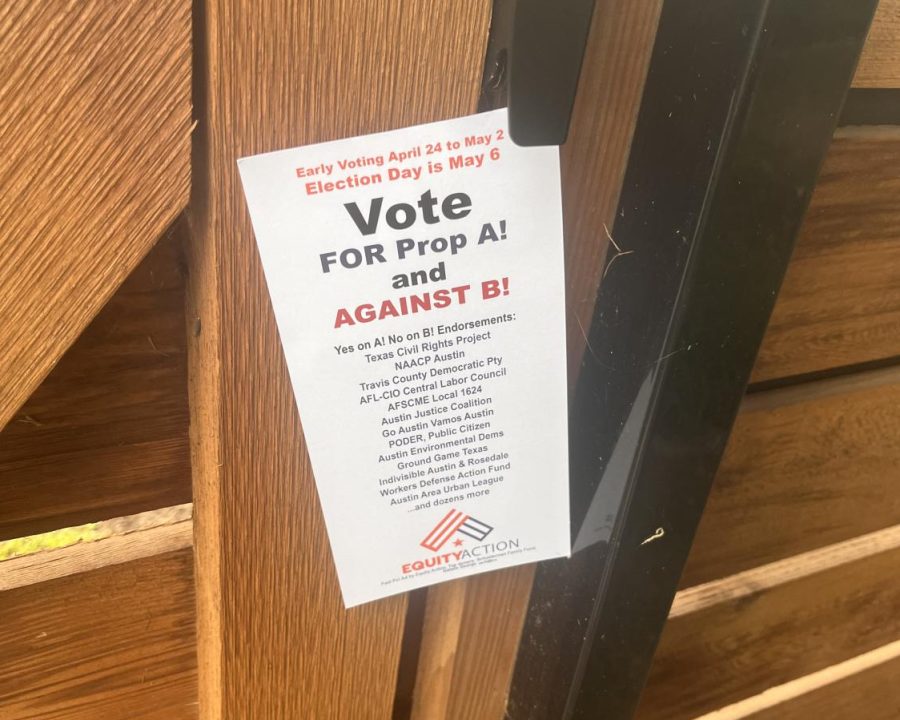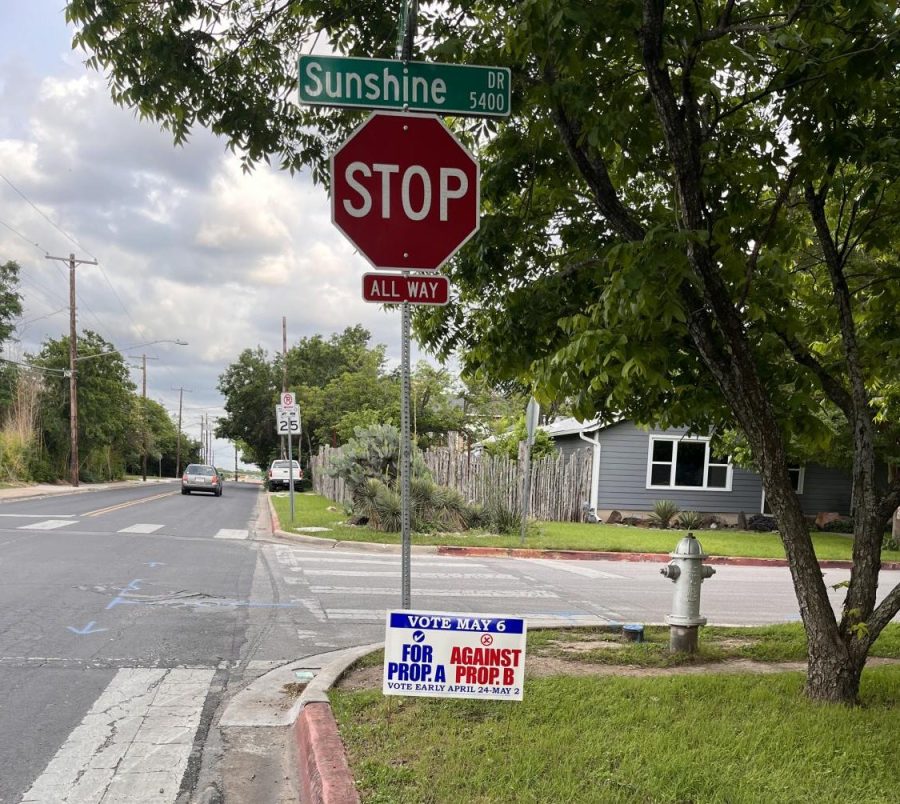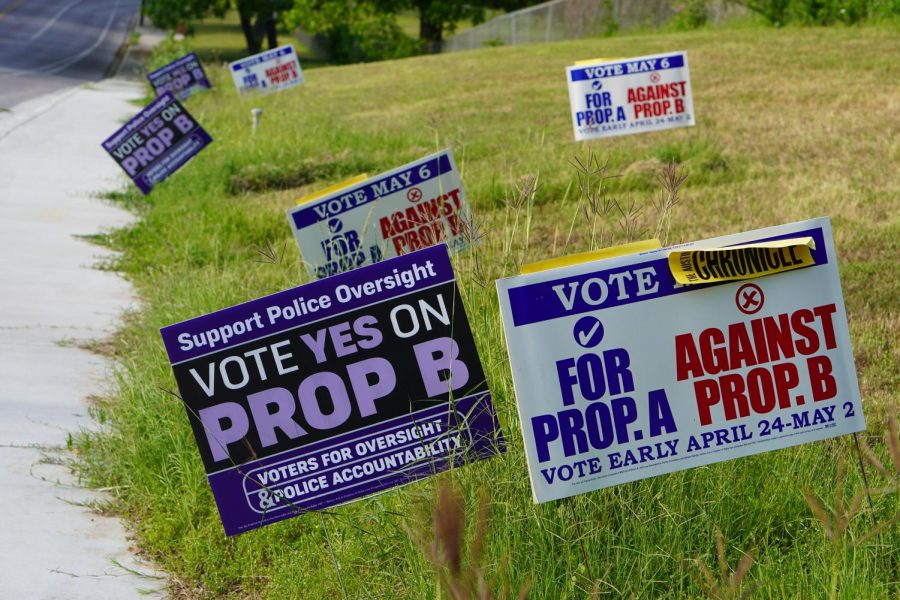What’s the Austin Police Oversight Act?
Propositions A and B share name on ballot, contain key differences in defining, handling police misconduct
Dueling signs offer opposite views on the fate of Proposition B on Exposition Boulevard just outside the polling location at Westminster Presbyterian Church in Tarrytown.
May 3, 2023
In the upcoming election, at the top of the ballot, there are two propositions, both titled “Austin Police Oversight Act.” The question of both propositions A and B is, “Shall the voters of Austin adopt an initiated ordinance strengthening the City’s system of independent and transparent civilian police oversight?” So, what is the difference between these two propositions?
The difference that is apparent on the Travis County voter sample ballot is who is circulating the proposition. Proposition A is circulated by Equity Action while Proposition B is circulated by Voters for Oversight and Police Accountability (VOPA).
Equity Action is an Austin group with the goal of transforming criminal justice in Austin.
“Our goals are to sustain and advance the criminal justice transformation efforts in Austin over the last five to seven years,” Equity Action board president Chris Harris said. “These include, but are not limited to, increasing police transparency, oversight, and accountability, as well as ensuring investments in public safety alternatives to police.”
Austin City Council approved Proposition A on Sept. 15, 2022.
“The Austin Police Oversight Act from Equity Action aka Prop A — the imposter Prop B was given the same name — seeks to amend the Austin city ordinance related to police oversight in order to strengthen the Office of Police Oversight by giving them unfettered access to information, input on what gets investigated, and increased fact-finding authority,” Harris said. “Prop A also seeks to expand the length of time for investigations that can result in on-the-job discipline for officers and to enable more information about police to be made public.”

VOPA is another Austin group. Although no direct contact information was available, The Shield reached out to the rumored connected agency, Austin Police Association Political Action Committee, but received no response.
“Voters for Oversight and Police Accountability is determined to turn negative trends around,” VOPA includes on its website, SaferAustin.com. “We want to ensure Austinites feel confident that their police force is run ethically and transparently. We also want to make sure that our police officers can be confident that any misconduct allegations will be addressed fairly and objectively.”
The City Council approved Proposition B on Feb. 9.
“The Austin Police Oversight Act is meant to bring transparency to the Austin Police Department,” the VOPA website said. “Its goal is to guarantee accountability for police misconduct and give the people of Austin a way to report alleged misconduct safely and anonymously. This act will make sure that information is made public whenever possible and Austin community members, not just the police department, have a voice in the disciplinary process of police officers.”
In a direct comparison of the two propositions, there are several differences. The first place in which they differ is within the caption of the propositions. Proposition A includes an ordinance that will “deter police misconduct and brutality,” which Proposition B does not include.
Additionally, in defining “serious misconduct” Proposition A includes “arrest or detention based on false criminal charges” and “discriminatory acts” that Proposition B scratches. Although the language is similar, Proposition A will strengthen the Office of Police Oversight’s role while Proposition B will weaken the Office of Police Oversight’s role.
Many newly eligible high school seniors must educate themselves before making informed decisions for elections. Senior Violet Levack registered to vote soon after turning 18 in April and plans to vote in the May 6 election.
“I registered to vote because I love my city,” Levack said. “I was born and raised here. I definitely want to make an impact, at least somewhat before I leave for college.”

In polling McCallum students, it was a challenge to find students knowledgeable of the two propositions and what they meant, so before interviews they were offered the League of Women Voters voting guide, which is a non-partisan guide with the goal of informing voters of what’s on their ballot.
“I did not know anything about either proposition before reading the guide,” Levack said. “I was a little confused at first. The wording was very similar. I definitely think it’s going to be confusing for people, especially people who are trying to learn the propositions before they vote and they can’t get a legitimate source.”
Levack is planning on voting for Proposition A and against B.
“I think [Proposition A] is a step in the right direction as to civilian safety,” Levack said. “There will be a chance for civilians to feel more justified in our legal system. I think if proposition B passed it would dim the voices of civilians that have been mistreated by police.”
Junior Sivaan Sharma, who can’t vote yet, already has concerns about police presence in Austin and is worried about what it would look like with Proposition B passed. Sharma is part of the student band Loose Knit.
“It causes a bit of hesitancy when it comes to public music,” Sharma said. “Austin has a very active teenage music scene which is known to draw punk crowds that might seem a little intimidating to state troopers despite being safe and harmless. At our [Loose Knit’s] most recent concert we cut our set short due to the news that officers were arriving out of the concern that they’d stop the show.”
Harris believes that it’s crucial that Proposition A passes for all Austinites.
“Too many people continue to be victimized by Austin police misconduct and brutality without any action from the City, other than paying out (much-deserved) civil settlements,” Harris said. “The City must do more to deter police misconduct and brutality by implementing a system that ensures it will be made public and result in on-the-job discipline, including suspensions and firings if warranted.
It is unclear what will happen if both propositions pass, but the predicted effect is that the two propositions will cancel each other out.
“[If both propositions pass] It’s likely that the police oversight system won’t change substantially, which is likely the actual goal of the people that financed Prop B, the Austin Police Association,” Harris said. “This is why they gave their measure the same name and description. They know that police oversight and accountability are popular and they didn’t have much hope of defeating Prop A, but by stirring confusion and having a similar-looking but actually opposite measure pass, they could prevent the reforms in Prop A from happening.”
Early voting ended on Tuesday, but the general election is May 6. To view polling stations or a sample ballot people can visit the Travis County Clerk website.







